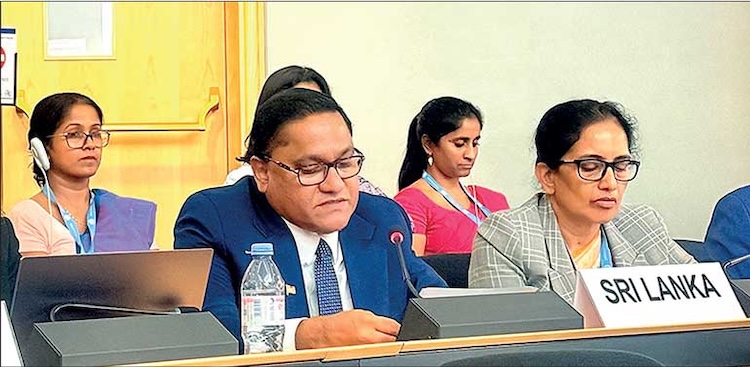By A.L.A. Azeez*
This article was first published on Daily FT.
COLOMBO, Sri Lanka | 19 October 2025 (IDN) — Foreign Minister Vijitha Herath made a statement in Parliament on Thursday, explaining Sri Lanka’s position at the 60th session of the Human Rights Council (HRC). On 8 September 2025, he delivered the country statement during consideration of the comprehensive report of the Office of the High Commissioner for Human Rights on reconciliation, accountability, and human rights in Sri Lanka.

Almost a month later, on 6 October 2025, when the Council adopted Resolution 60/1 on Sri Lanka without a vote, Sri Lanka’s Permanent Representative to the UN in Geneva reiterated the Government’s rejection of the resolution.
Tracing the Evolution of Geneva Resolutions
The Minister’s statement—latest in a long series—attributes to Resolution 46/1 (2021) the intensification of the internationalisation of domestic concerns through the adoption of the Sri Lanka Accountability Project (SLAP). It blames previous Governments for this internationalisation and for wasting public funds in failed attempts to defeat resolutions in 2012, 2013, 2014, 2021, and 2022.
The statement grudgingly acknowledges positive developments since 2015, including the Office on Missing Persons and the Office for Reparations. It regrets the inconsistent approaches of successive Governments from 2009 to 2022—ranging from initiating resolutions (2009), outright rejection (2012–2014), co-sponsorship (2015–2019), renewed rejection (2021–2022), and finally consensual adoption (2024).
An Attempt at Historical Revisionism
The withdrawal of co-sponsorship from Resolution 30/1 (2015) by the Gotabaya Rajapaksa administration in 2020 represented an act of historical revisionism—a divisive domestic strategy cloaked in nationalism.
Minister Herath also underscored the futility of earlier calls for votes at the Council that led to Sri Lanka’s defeats, noting the waste of public funds on foreign lobbying trips designed to create an illusion of “defending sovereignty.” These resources, he observed, could have been better directed toward resolving the underlying issues that gave rise to the resolutions.
Wasteful Diplomacy and Public Burden
The article details how Ministers, officials, and even selected NGO and religious representatives were dispatched abroad to “lobby” against resolutions. One example cited was a former Foreign Minister’s two state-funded trips to Geneva in 2022—despite knowing that the vote would not be in Sri Lanka’s favour—resulting in unnecessary expenditure.
Public frustration with such wasteful spending intensified during the 2022 economic crisis, when the State could ill afford “lavish” foreign travel for predictably unsuccessful lobbying.
In 2012, Opposition MP Sajith Premadasa questioned the then Foreign Minister about the Geneva delegation’s cost; the Minister refused to reveal numbers, citing “national security,” but admitted that Rs. 59 million had been spent. Sri Lanka lost that vote too—securing only 15 of 47 votes at the HRC.
Voting Patterns and the Illusion of Sovereignty
From 2009 onward, Sri Lanka’s position rested on three arguments:
- Solutions to Geneva’s concerns must not be externally imposed.
- The Government should be given “time and space” to evolve domestic solutions.
- Abstentions should count as votes against the resolutions.
This reasoning, coupled with claims of illegitimacy due to low affirmative votes, masked the reality that no genuine domestic reforms occurred, and the Lessons Learnt and Reconciliation Commission (LLRC) recommendations were largely ignored.
The Question of Domestic Mechanisms
Minister Herath now echoes the call for “appropriate local mechanisms” but disavows earlier arithmetic about vote counts. Unlike previous Governments that demanded indefinite “time and space,” he implies that domestic action will proceed to conclude the Sri Lanka Accountability Project (SLAP) before the 66th HRC session (September 2027)—potentially convincing the international community that extended monitoring is unnecessary.
In 2015, the late Foreign Minister Mangala Samaraweera justified co-sponsoring Resolution 30/1 as reclaiming ownership of the accountability process from international hands—a stance now selectively reinterpreted to “bring back” internationalised matters to domestic jurisdiction.
Nationalism, Strategy, and Consequences
The 2021 Resolution 46/1 marked a turning point, introducing an external evidence-gathering mechanism that many view as a diplomatic nadir for Sri Lanka.
Today, the NPP Government faces a threefold challenge:
- Damage control – salvaging Sri Lanka with minimal reputational cost.
- Non-confrontational engagement – demonstrating responsibility without hostility.
- Strategic benefit – leveraging constructive engagement for long-term international gains as the nation recovers from economic collapse.
Critics argue that refusing to request a vote on the resolution amounts to passivity. Yet, seeking such a vote could have deepened divisions and produced a harsher outcome.
Moreover, appeals for votes in the past often required quid pro quo diplomatic commitments—pledging support for other nations’ UN candidacies or interests—leaving Sri Lanka indebted for years.
The Need for a Sustainable Strategy
Since 2009, each Government has adopted a distinct, often politically expedient, Geneva strategy:
- Initiating resolutions,
- Rejecting and confronting them,
- Co-sponsoring,
- Selectively rejecting paragraphs, or
- Accepting consensual “roll-overs.”
What remains absent is a long-term, coherent national policy.
The Elephant in the Room: Security and Law Reform
A sustainable resolution of Geneva’s concerns depends on security-sector and legal reforms—creating independent, credible institutions insulated from political or intelligence interference, upholding the rule of law, and ensuring non-recurrence of violations.
Such reforms require dialogue and engagement, not confrontation. A responsible state must internalise human rights norms, prevent discrimination and violence, and ensure accountability—foundations for genuine reconciliation.
Conclusion
Foreign Minister Herath’s statement clarifies why the NPP Government adopted a non-confrontational approach at the 60th HRC session—signalling a willingness to engage constructively while maintaining a tone of sovereignty for domestic audiences.
Though couched in the rhetoric of rejection, the underlying message is one of pragmatic engagement. Yet, as the adage reminds us:
“Actions speak louder than words.” [IDN-InDepthNews]
*A.L.A. Azeez is a former Permanent Representative of Sri Lanka to the UN in Geneva and a retired foreign service officer. He may be contacted via email: alaazeez@gmail.com
Daily FT – 18 October 2025
Image: Sri Lankan Foreign Minister Vijitha Herath explaining Sri Lanka’s position at the 60th session of the Human Rights Council on 8 September 2025. Source: Daily FT

